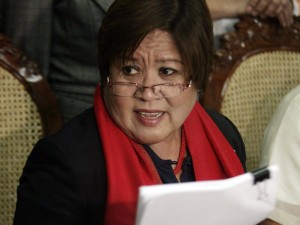MANILA, Philippines—A delegation led by Justice Secretary Leila de Lima left for Geneva, Switzerland, over the weekend for the second cycle of the Universal Periodic Review, which will assess the human rights record of the Philippines on May 29.
“The Universal Periodic Review (UPR) of the United Nations Human Rights Council is a mechanism by which the human rights records of UN member-countries are reviewed by member-states with a view to further promote and protect the overall enjoyment of people’s human rights,” the Department of Foreign Affairs said.
It noted that De Lima was a human rights advocate and chaired the Commission on Human Rights in the Arroyo administration. The delegation includes representatives from various government agencies.
The delegation will address concerns raised at the UN Human Rights Council regarding alleged extrajudicial killings, disappearances and torture.
Militants belonging to the Philippine UPR Watch arrived in Geneva ahead of the Philippine delegation and said yesterday that they had found a receptive audience in various foreign missions regarding “the real state of human rights in the Philippines.”
Positive reception
Karapatan chair Marie Hilao-Enriquez, also coleader of Philippine UPR Watch, said in a statement that the lobbying efforts of the group, which is composed of 15 human rights and peace advocates as well as church and mass organizations from the Philippines and abroad, had been received positively by a diverse list of foreign dignitaries who have commonly expressed their keen interest in knowing more about the Philippine rights situation on the ground.
“A significant number of foreign missions that have candidly discussed issues and questions with the various teams of the Philippine UPR Watch delegation have signified their concerns about the compliance of the Philippine government with its commitment and pledges to the recommendations on the first cycle of UPR in 2008 as well as other undertakings it should fulfill,” Enriquez said.
71 participating countries
She said that 71 countries had listed up to make statements, ask questions and make recommendations to the Philippine government on a wide array of outstanding human rights issues when the Manila panel comes under scrutiny on May 29.
“The foreign missions have assured the delegation that they will take into serious consideration all the concerns raised by the Philippine UPR Watch and counterpose these with the official national report of the Philippine government,” Enriquez said.
The recurrent points that surfaced through the face-to-face interactions with the foreign missions include the continuing extrajudicial killings, enforced disappearances and torture, impunity, the rights of women and children, militarization of indigenous communities and other pressing issues, she said.
According to Enriquez, after four years from the time the UPR was instituted by the Human Rights Council in 2008, the Philippine government had largely failed to fulfill its promises in the first UPR cycle because various forms of human rights violations continued to occur and impunity still remained.
“Practically no one has been held to account and the Aquino administration has remained passive, if not indifferent, to the demands for justice for the victims,” she said.


